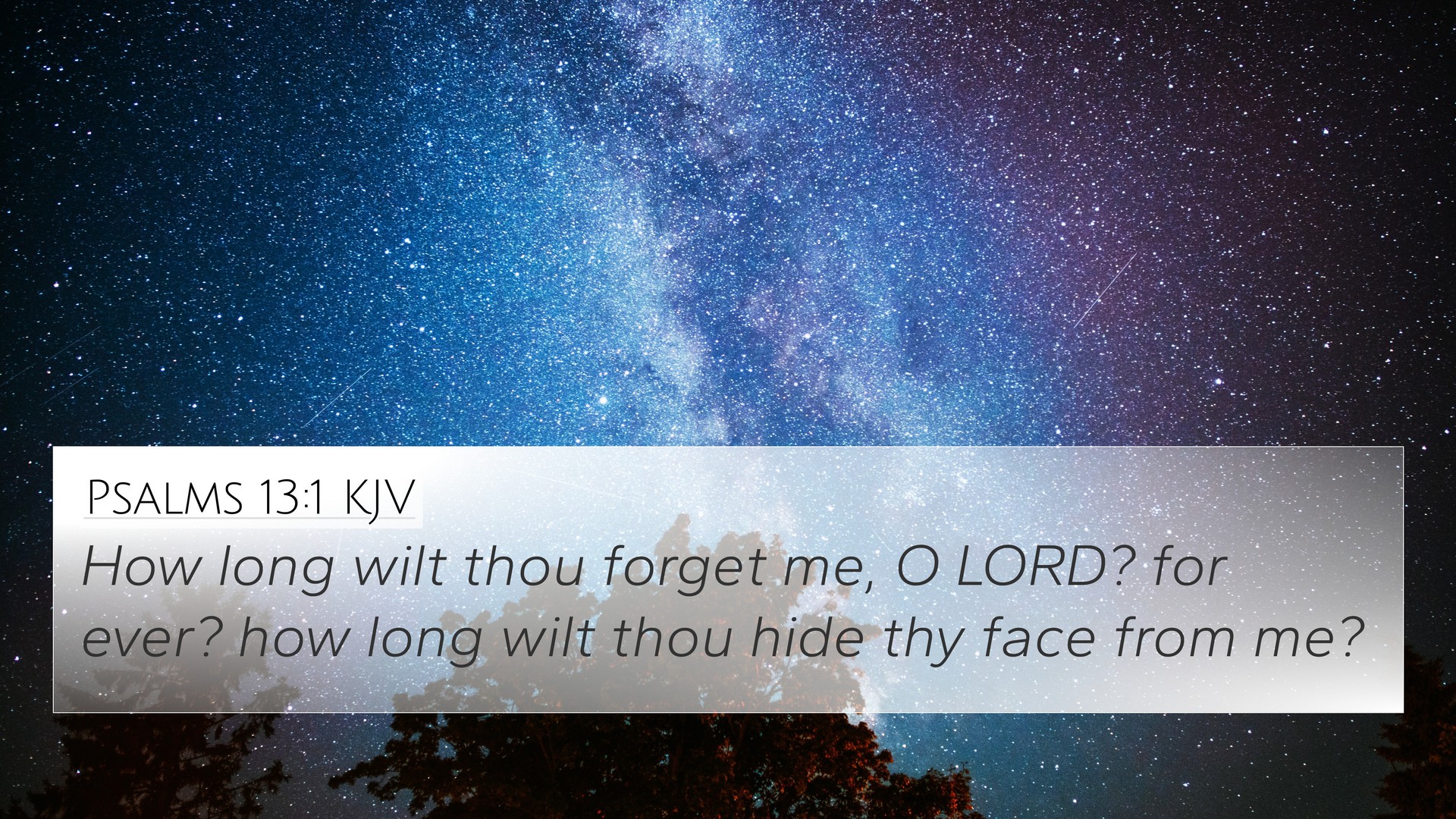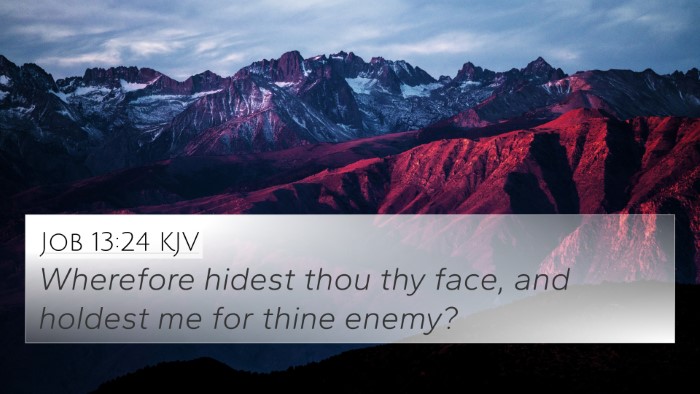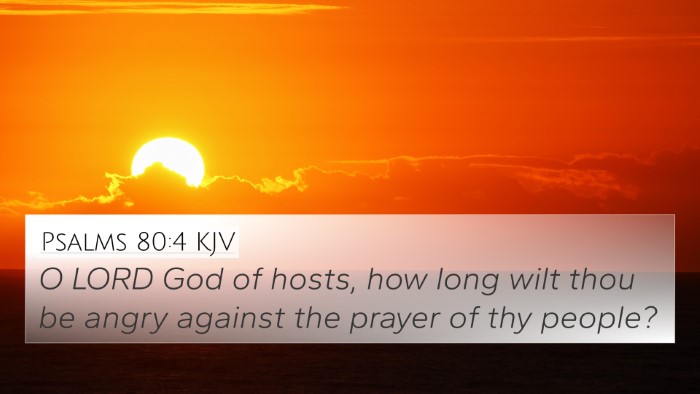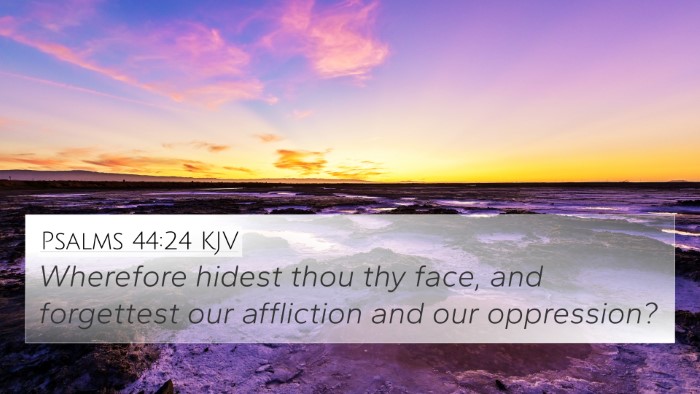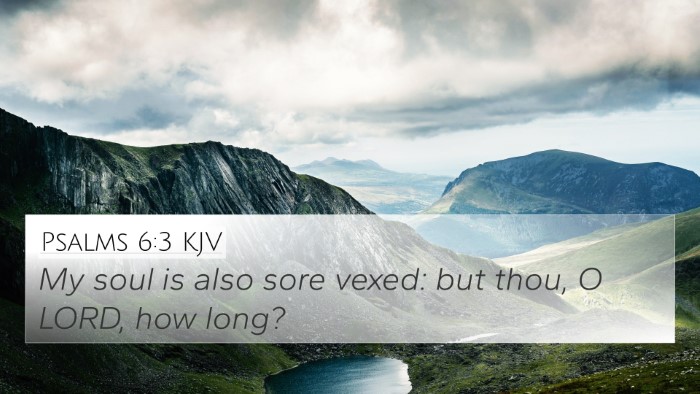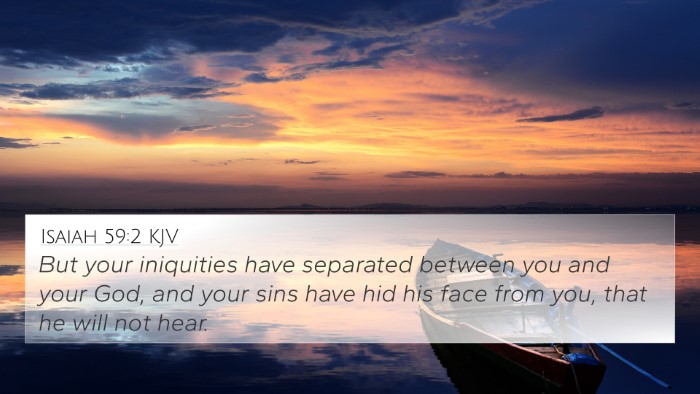Understanding Psalms 13:1
Psalms 13:1 states:
"How long, O Lord? Will you forget me forever? How long will you hide your face from me?"
This verse encapsulates a heartfelt cry from the psalmist, expressing a deep sense of abandonment and longing for God's presence. Below is a synthesized interpretation of its meaning, highlighting insights from various public domain commentaries.
Summary of the Verse Meaning
The essence of Psalms 13:1 reflects a profound human emotion — the feeling of distance from God during troubling times. Matthew Henry, in his commentary, emphasizes the urgency and despair in the psalmist's plea. The repetition of "how long" suggests an intense yearning for divine intervention and a sense of urgency.
Albert Barnes notes that the question indicates a sense of abandonment; the psalmist feels as if God has forgotten him completely. This sentiment resonates with many who experience prolonged trials, leading them to wonder about God's presence in their lives.
Adam Clarke adds that the imagery of God's "face" being hidden symbolizes a withdrawal of divine favor, which can be especially disheartening for one seeking guidance and comfort.
Key Insights from Public Domain Commentaries
- Emotional Expression: The psalmist articulates feelings of despair, reflecting a universal human experience when faced with suffering.
- Desire for Divine Awareness: There is a passionate plea for God to acknowledge the psalmist's plight, illustrating the need for divine attention.
- Sense of Abandonment: The notion of being forgotten by God raises critical theological questions about divine timing and presence in adversity.
- Imagery of God's Presence: The "face" of God implies a longing for communion, underscoring the importance of a relationship with the divine.
- The Repetition of "How Long": This repetition signifies desperation, often seen in other psalms that express similar themes of waiting for God’s response.
Cross-References to Psalms 13:1
To further explore the themes in Psalms 13:1, here are several Bible verses that relate to or echo its sentiments:
- Psalms 10:1: "Why, O Lord, do you stand far off? Why do you hide yourself in times of trouble?"
- Psalms 42:9: "I say to God my Rock, 'Why have you forgotten me? Why must I go about mourning, oppressed by the enemy?'"
- Psalms 22:1: "My God, my God, why have you forsaken me?"
- Lamentations 3:20-22: "I remember my affliction and my wandering, the bitterness and the gall... Yet this I call to mind and therefore I have hope."
- Isaiah 54:7: "For a brief moment I abandoned you, but with deep compassion I will bring you back."
- Matthew 27:46: "About the ninth hour Jesus cried out in a loud voice, 'Eli, Eli, lema sabachthani?' (My God, my God, why have you forsaken me?)"
- Romans 8:35: "Who shall separate us from the love of Christ? Shall trouble or hardship or persecution or famine or nakedness or danger or sword?"
Thematic Connections
Psalms 13:1 serves as a vital link in the thematic exploration of despair and divine silence present throughout the Scriptures. The connections between various Bible verses demonstrate a rich inter-Biblical dialogue that reflects on human suffering and the search for God:
- Shadow of Suffering: Many Biblical figures grapple with feelings of abandonment. Job’s laments (Job 30:20) echo the emotion found in Psalms 13:1.
- Desire for God’s Presence: The repeated cries in Psalms resonate with the longing for communion found in New Testament teachings, particularly in the teachings of Jesus (Matthew 11:28).
- Hope Amid Despair: The idea of waiting on the Lord, as seen in Psalms 27:14, reassures the faithful during times of doubt.
- Inter-Biblical Dialogue: The feelings expressed in Lamentation reflect similar despair; however, they conclude with a glimmer of hope (Lamentations 3:22-23), tying back to Psalms' themes.
Tools for Understanding and Cross-Referencing
For those engaging in a deeper study of Scripture and its interconnected themes, various tools and resources are beneficial:
- Bible Concordance: A useful tool to locate verses based on keywords and themes.
- Bible Cross-Reference Guide: A structured approach to find verses that relate thematically or contextually.
- Cross-Reference Bible Study: An enlightening method to understand the dialogue within the Scriptures.
- Comprehensive Bible Cross-Reference Materials: A collection of resources providing extensive interconnections among verses.
Conclusion
Psalms 13:1 opens a door to understanding our own struggles in relation to God's perceived absence. By acknowledging that many throughout biblical history have wrestled with similar feelings, we can find solace and hope. As we continue to explore cross-references and thematic connections, the profound wisdom of the Scriptures unfolds, guiding us through our spiritual journeys.
